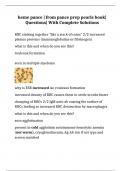Small dense basophilic - Study guides, Class notes & Summaries
Looking for the best study guides, study notes and summaries about Small dense basophilic? On this page you'll find 9 study documents about Small dense basophilic.
All 9 results
Sort by
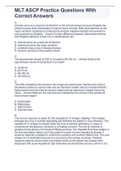
-
MLT ASCP Practice Questions With Correct Answers
- Exam (elaborations) • 29 pages • 2022
-
- $20.99
- 1x sold
- + learn more
A; Animals serve as a reservoir of infection" is the correct answer because Shigella only infects humans while Salmonella is found in many animals. Both have diarrhea as the major symptom. Endotoxin is produced by all gram negative bacteria and exotoxin is only produced by Shigella. A major difference between Salmonella enterica and Shigella infections is that only in salmonellosis can: A. animals serve as a reservoir of infection B. diarrhea become the major symptom C. endotoxin play a ...
heme pance | from pance prep pearls book| Questions| With Complete Solutions

-
ASCP Recalls Exam Questions and Complete Solutions Graded A+
- Exam (elaborations) • 45 pages • 2024
- Available in package deal
-
- $13.49
- + learn more
FFP used for - Answer: Multiple coagulation deficiencies Factor XI deficiency Cryoprecipitate used for - Answer: Replace fibrinogen loss due to DIC Massive bleeding Dysfibrinogenemia with active bleeding Plateletpheresis preparation steps - Answer: Light spin (remove RBC) Heavy spin (spin down PLT and WBC) Supernatant goes into bag for freezing (FFP) Remaining plasma, platelets, and WBC = platelets Irradiated blood prevents - Answer: GVHD Also used for ca...
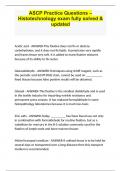
-
ASCP Practice Questions – Histotechnology exam fully solved & updated
- Exam (elaborations) • 11 pages • 2024
-
- $7.99
- + learn more
Acetic acid - ANSWER-This fixative does not fix or destroy carbohydrates, and it does not fix lipids. It penetrates very rapidly and leaves tissue very soft. It is added to many fixative mixtures because of its ability to fix nuclei. Glutaraldehyde - ANSWER-Techniques using Schiff reagent, such as the periodic acid-Schiff (PAS) stain, cannot be used on __________ fixed tissues because false positive results will be obtained. Glyoxal - ANSWER-This fixative is the smallest dialdehyde and is ...
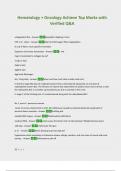
-
Hematology + Oncology Achieve Top Marks with Verified Q&A
- Exam (elaborations) • 40 pages • 2024
-
- $13.49
- + learn more
undegraded rRna - Answer basophilic stippling is from FDP vs D - dimer - Answer Fdp from fibrinogen/ fibrin degradation D only fr fibrin; more specific f thrombin Sequence of primary hemostasis - Answer 1 vwf 2 gp1 crosslonked to collagen by vwf 3 adp ca txa2 4adp to p2y 5gp2/3 expr 6gp binds fibrinogen 6m, 11mg daily - Answer when and how much does a baby need iron? In the first stage IM) dose of unlabeled vitamin B12 is administered along with an oral dose of radiolabeled vitamin B1...
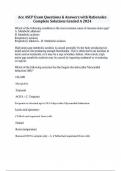
-
Ace ASCP Exam Questions & Answers with Rationales Complete Solutions Graded A 2024
- Exam (elaborations) • 129 pages • 2024
-
Available in package deal
-
- $14.00
- + learn more
Which of the following condition is the most common cause of increase anion gap? A. Metabolic alkalosis B. Metabolic acidosis Respiratory acidosis Respiratory alkalosis - B. Metabolic acidosis High anion gap metabolic acidosis is caused generally by the body producing too much acid or not producing enough bicarbonate. This is often due to an increase in lactic acid or ketoacids, or it may be a sign of kidney failure. More rarely, high anion gap metabolic acidosis may be caused by ingesting meth...

-
ASCP MLT Exam Questions Answered 100% Correct
- Exam (elaborations) • 34 pages • 2023
-
- $14.49
- + learn more
ACD/CPD/CPD2 - ANSWER-21 days CPDA-1 - ANSWER-35 days Infants HDFN from ABO - ANSWER-Spherocytes 1st pregnancy O mother Permanent deferral - ANSWER-Hepatitis after 11 HIV T. Cruzi CJD 1 unit or PRBC - ANSWER-Raises hemoglobin 1g and hematocrit 3% Leukoreduced RBCs - ANSWER-Less than 5 x 10^6 to prevent febrile non hemolytic reactions Cryoprecipitate - ANSWER-Factor 8 vWF Fibrinogen For DIC 6 hours Platelets 1unit - ANSWER-5000 10000 Irradiated blood - ANSWE...
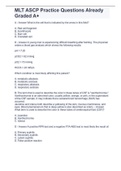
-
MLT ASCP Practice Questions Already Graded A+
- Exam (elaborations) • 31 pages • 2022
-
- $19.99
- + learn more
A What is the cell that is indicated by the arrow in this field? A. Red cell fragment B. Acanthocyte C. Burr cell D. Crenated cell D A young man is experiencing difficult breathing after fainting. The physician orders a blood gas analysis which shows the following results: pH = 7.25 pCO2 = 62 mmHg pO2 = 70 mmHg HCO3 = 23 mEq/L Which condition is most likely afflicting this patient? A. metabolic alkalosis B. metabolic acidosis C. respiratory alkalosis D. respir...
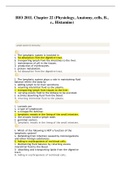
-
BIO 201L Chapter 22 (Physiology, Anatomy, cells, B., c., Histamine) | Questions and Answer solutions | Download To Score An A
- Exam (elaborations) • 25 pages • 2022
-
- $10.99
- + learn more
BIO 201L Chapter 22 (Physiology, Anatomy, cells, B., c., Histamine) 1. The lymphatic system is involved in A. fat absorption from the digestive tract. B. transporting lymph fro m the intestines to the liver. C. maintenance of pH in the tissues. D. production of erythrocytes. E. protein metabolism. A. fat absorption from the digestive tract. 2. The lymphatic system plays a role in maintaining fluid balance within the body by A. adding lymph to GI tract secretions. B. returning interstitial fluid ...

Did you know that on average a seller on Stuvia earns $82 per month selling study resources? Hmm, hint, hint. Discover all about earning on Stuvia

